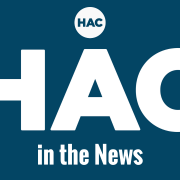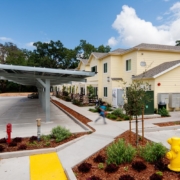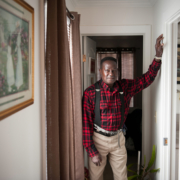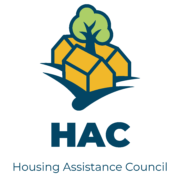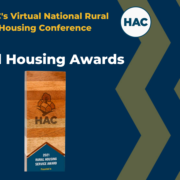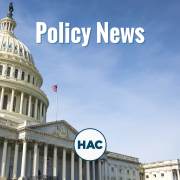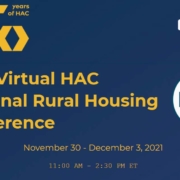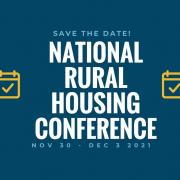Rural Veterans and Local Nonprofits Receive Critical Housing Support
Contact: Dan Stern, dan@ruralhome.org
AHRV Team, ahrv@ruralhome.org
(202) 842-8600
Rural Veterans and Local Nonprofits Receive Critical Housing Support
Funded by The Home Depot Foundation
Washington, DC, June 7, 2022 – Veterans and their families in thirteen rural communities will have better lives, thanks to The Home Depot Foundation and the Housing Assistance Council. The Foundation is awarding grants totaling $375,107 to thirteen local nonprofit housing agencies around the country to preserve housing for veterans in rural America.
The grants are part of The Home Depot Foundation’s mission to improve the homes and lives of U.S. veterans and invest $500 million in veteran causes by 2025. Many veterans and their families face major housing challenges, often exacerbated by issues related to unemployment, age, and service-related disabilities. The Home Depot Foundation and the Housing Assistance Council (HAC) are dedicated to giving back to those who have answered the highest call of service to our nation.
As part of its Affordable Housing for Rural Veterans (AHRV) Initiative, HAC works with The Home Depot Foundation to administer grants that bolster and support the work of rural nonprofit housing agencies to deliver critical housing support to veterans. “HAC’s partnership with The Home Depot Foundation continues to be a vital factor in our ability to strengthen the capacity of local rural organizations in their efforts to build and preserve homes of veterans across rural America,” said David Lipsetz, HAC’s CEO. “Growing nonprofit capacity empowers communities and serves as an impact multiplier, enabling nonprofits to expand their services and assist more veterans with overcoming housing challenges.” As rural America is home to a disproportionately high number of service women and men, HAC remains deeply committed to supporting our nation’s service women and men by uplifting local nonprofits and their work to house and ensure the safe habitability of their homes and rural communities.
The grantee organizations – described below – provide a range of programs. With the grants, veterans who own homes in Arkansas, Arizona, Louisiana, Mississippi, North Dakota, New York, Pennsylvania, South Dakota, Texas, Wisconsin, and West Virginia will obtain critical repair assistance. Altogether, 65 veterans and their families will benefit from these grants.
About The Home Depot Foundation
The Home Depot Foundation works to improve the homes and lives of U.S. veterans, support communities impacted by natural disasters and train skilled tradespeople to fill the labor gap. Since 2011, the Foundation has invested more than $400 million in veteran causes and improved more than 50,000 veteran homes and facilities. The Foundation has pledged to invest half of a billion dollars in veteran causes by 2025 and $50 million in training the next generation of skilled tradespeople through the Path to Pro program.
To learn more about The Home Depot Foundation visit HomeDepotFoundation.org and follow us on Twitter @HomeDepotFound and on Facebook and Instagram @HomeDepotFoundation.
About the Housing Assistance Council
The Housing Assistance Council (HAC) is a national nonprofit that supports affordable housing efforts throughout rural America. Since 1971, HAC has provided below-market financing for affordable housing and community development, technical assistance and training, research and information, and policy formulation to enable solutions for rural communities.
About the Grantees
- Adults and Youth United Development Association, Inc., San Elizario, TX, will utilize $30,000 to provide needed critical repairs for ten (10) veterans in the Border Colonia area of the state of Texas. For additional information on Adults and Youth United Development, Inc., visit their Facebook page at https://www.facebook.com/ayudaorg/.
- Bethlehem Farms, Inc., Alderson, WV, will utilize $30,000 to support rehabilitation and modification of eight (8) veteran homes, prioritizing critical repairs to remove unsafe living conditions. For additional information on Bethlehem Farms, Inc., visit their website at https://bethlehemfarm.net.
- Eureka Christian Health Outreach, Eureka Springs, AR, will utilize $28,350 to support the development of one (1) “small home” which will become part of the Echo Village community, which serves veteran residents with temporary housing together with access to critical counseling, medical, skills training, social services, and “best life possible” supportive services. For additional information on Eureka Christian Health Outreach, visit their website at www.echofreeclinic.org.
- Good Works, Inc., Coatesville, PA, will utilize $14,891 to provide critical health and safety repairs to one (1) home of an elderly veteran. For additional information on Good Works, Inc., visit their website at https://www.goodworksinc.org.
- GROW South Dakota, Sisseton, SD, will utilize $30,000 to provide critical home repairs for six (6) veterans. For additional information on GROW South Dakota, visit their website at https://www.growsd.org.
- Habitat for Humanity Wisconsin River Area, Baraboo, WI, will utilize $30,000 to support critical repairs and accessibility modifications for five (5) rural low-income disabled veterans. For additional information on Habitat for Humanity Wisconsin River Area, visit their website at https://hfhwisconsinriver.org.
- Hope for All, Mountain Home, AR, will utilize $31,866 to support the renovation and structural repairs to a seventy (70) year old home, used as a homeless shelter to assist four (4) rural veterans. For additional information on Hope for All, visit their website at https://www.hopeforallmh.org.
- Mississippi Center for Police & Sheriffs, Raymond, MS, will utilize $30,000 to assist in the construction of one (1) veteran cottage, which will become part of a fifteen (15) unit “Warrior Cottages” housing complex meeting the need for emergency and transitional housing for veterans. For additional information on the Mississippi Center for Police & Sheriffs, visit their Facebook page at https://www.facebook.com/search/top/?q=MS%20Center%20for%20Police%20and%20Sheriffs
- Rebuilding Together Fargo-Moorhead Area, Fargo, ND, will utilize $30,000 to support the rehabilitation and ADA modification of three (3) veteran owned units. For additional information on Rebuilding Together Fargo-Moorhead Area, visit their website at https://www.rebuildingtogetherfma.org.
- Rebuilding Together Saratoga County, Ballston Spa, NY, will utilize $30,000 to support the rehabilitation and modification of four (4) veteran owned units. For additional information on Rebuilding Together Saratoga County, visit their website at https://www.rtsaratoga.org.
- Red Feather Development Group, Flagstaff, AZ, will utilize $30,000 to assist six (6) Native American veteran homeowners with critical roof replacements and ADA modifications. For additional information on Red Feather Development Group, visit their website at www.redfeather.org.
- Southern Appalachian Labor School, Kincaid, WV, will utilize $30,000 to construct ADA accessible ramps and address critical adaptation or safety issues for twelve (12) veterans. For additional information on Southern Appalachian Labor School, visit their Facebook page at https://www.facebook.com/Southern-Appalachian-Labor-School-284621148272166/.
- Tangi Community Development, Amite, LA, will utilize $30,000 to support rehabilitation and ADA modifications on four (4) disabled veteran homes. For additional information on Tangi Community Development, visit their website at https://www.tangicdcnonprofit.org.

